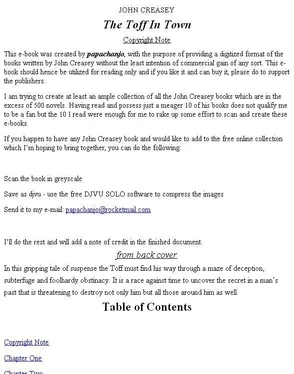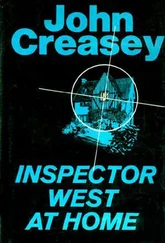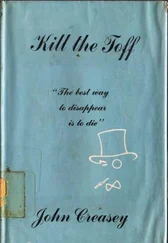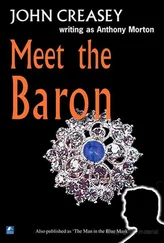John Creasey - The Toff In Town
Здесь есть возможность читать онлайн «John Creasey - The Toff In Town» весь текст электронной книги совершенно бесплатно (целиком полную версию без сокращений). В некоторых случаях можно слушать аудио, скачать через торрент в формате fb2 и присутствует краткое содержание. Жанр: Старинная литература, на русском языке. Описание произведения, (предисловие) а так же отзывы посетителей доступны на портале библиотеки ЛибКат.
- Название:The Toff In Town
- Автор:
- Жанр:
- Год:неизвестен
- ISBN:нет данных
- Рейтинг книги:5 / 5. Голосов: 1
-
Избранное:Добавить в избранное
- Отзывы:
-
Ваша оценка:
- 100
- 1
- 2
- 3
- 4
- 5
The Toff In Town: краткое содержание, описание и аннотация
Предлагаем к чтению аннотацию, описание, краткое содержание или предисловие (зависит от того, что написал сам автор книги «The Toff In Town»). Если вы не нашли необходимую информацию о книге — напишите в комментариях, мы постараемся отыскать её.
The Toff In Town — читать онлайн бесплатно полную книгу (весь текст) целиком
Ниже представлен текст книги, разбитый по страницам. Система сохранения места последней прочитанной страницы, позволяет с удобством читать онлайн бесплатно книгу «The Toff In Town», без необходимости каждый раз заново искать на чём Вы остановились. Поставьте закладку, и сможете в любой момент перейти на страницу, на которой закончили чтение.
Интервал:
Закладка:
“That’ll do fine,” said Rollison. “Same address?”
“Same address,” said Bill. “Feed ‘im up like a prince, I s’pose?”
“Just look after him,” said Rollison. “I’ll tell Perky to go straight there, shall I?”
“Better not use Perky’s cab all the way, eyes at the back o’ their ‘eads, these flicking busies, an’ you never know wot the flamin’ narks might see. Coin’ with him?”
“Perhaps I’d better,” said Rollison.
“Okay. Tell Perky ter drive as far as Old Wattle’s,” said Bill, “I’ve told Wattle to ‘ave a van ready.”
Rollison nodded, patted Ebbutt on the shoulder, and went to the door. Before he reached it, Ebbutt was on his way to the dressing-rooms. Rollison smiled reflectively, then glanced into the cab and found Allen still hunched up in his corner.
“Old Wattle’s,” he said to Perky.
“Oke,” said Perky.
The drive to “Old Wattle’s took a quarter of an hour. They went through the dingier streets of the East End, passed row upon row of little houses, where children, some bare-footed and many of them in rags, played in the roadway and jeered and gestured at the passing taxi, and where women leaned against their doorways and talked with their neighbours and looked with furtive curiosity at it. Perky, who knew this district as well as he knew the West End, took a bewildering series of short cuts, drove under railway arches and down streets which looked as if they were dead-ends, skidded round corners, waved his hand at two policemen who were standing before a gaunt warehouse near the river, and eventually pulled up near a railway arch on which were the words: “ Wattle—Storage—Removals—Garage. ”
“Old Wattle’ was a very old man who needed a shave and a wash, and who smoked a dirty-looking black pipe. He carried on a curiously one-sided conversation with Perky, speaking in a voice so low that Rollison seldom caught his words As he waited, Rollison saw that all of the arches here were marked with the name Wattle. Presumably some of them were used as furniture warehouses; probably some were used, at times, to hide stolen goods.
Perky came away at last.
“Okay,” he said. “Get in.”
He revved up the engine and drove into the railway arch, which was dark and gloomy, lit only by the day-light which filtered through from the street. At the far end were several small vans and pantechnicons. Two or three men stood about, one of them making tea over a gas-ring. Nearest the road at this end of the arch stood a small, plain van.
Perky jumped down and told Rollison and Allen to follow him. He opened the back of the van, Rollison and Allen climbed in, and the doors were closed on them. Allen gave a long-suffering sigh, but made neither protest nor comment. They sat down on a wooden seat.
The van bumped over cobblestones, then smoothly along good roads. The only light came from a circular window in the back. Rollison realised that the driver was taking a roundabout route, to make sure that they were not followed.
At last they stopped.
“Here we are,” said Rollison.
The doors at the back were opened and a stranger—a little man in his shirt-sleeves—beckoned them. They were in a yard surrounded by high walls. At one end of the yard was a tall, Victorian house, an ugly pile which looked uninviting. This was Dinky’s—an apartment house in Bethnal Green.
Allen stood blinking in the bright daylight.
“What do you expect me to do?” he growled.
“Just stay where you are,” said Rollison. “I’ll see that your wife’s all right, and you’ll be safe here.”
“You mean, I’m a prisoner?”
Rollison said: “I mean you’ll be a fool if you leave.”
The journey back to Wattle’s took much less time than the outward journey.
Perky’s cab was gone. Old Wattle stood in the shadows of the arch, pulling at his pipe. He took it from his lips and pointed the stem towards one end of the lane. Another taxi, older and more dilapidated than Perky’s, stood by the kerb.
“Perky’ll be seein’ yer,” he announced.
“Thanks. Rollison slipped five pound notes into a grimy, calloused hand, and Old Wattle acknowledged these with a nod. Rollison entered the other taxi, and Wattle watched it out of sight.
At last, Rollison took the foolscap envelope from his pocket.
He had already read the original script, which told a little of Allen’s Burma ordeal. Brief though it was, something of his courage and endurance shone through. He read it again, thinking of Allen’s behaviour now, wondering whether the experiences he had undergone were alone responsible. Allen had lived nearly four years with a jungle tribe, had suffered badly from malaria, had several times tried to get out of the wooded valley where he had crashed, only to find great mountain ranges hemming him in. The tribe had never been beyond the valley; it had looked as if Allen would never get out. On one sortie, he had broken his leg, and although all that he was to say over the air was that a native doctor had set it, Rollison found it easy to read between the lines. He remembered Allen’s bad limp, due to that makeshift setting. It was a touching story of patient heroism during a period when Allen must have reached the utter depths of despair. In spite of his earlier disgust with him, Rollison felt his pulse quickening as he read the words which Allen was to speak:
“I’d lost count of time. I just gave up hoping. Then one day one of the natives came in, jabbering away and pointing at me. Others crowded round. I was told to pack the few oddments I still had by me, and get ready for a trek. Eight natives accompanied me. They made me understand that other white men were in the valley. I could hardly believe my luck.”
There the interviewer was to say:
“I can well understand it. And that was the end of your adventures?”
Allen’s next words read:
“I wish I could say so. I don’t really know what happened, but I assume my guides and I ran into a hostile tribe—and the other side had modern weapons. We were shot up. I escaped—the only one left alive. I thought that really was the end, but there was a party of white men—mostly Americans—who were making a documentary film, and I met up with them.”
“You just met up with them,” was the interviewer’s dry comment.
“Yes. And they looked after me and eventually took me to Rangoon.”
“Well, I won’t call you lucky,” the interviewer was to say, “but we’re all delighted that you came through, Mr. Allen.”
That was the final part of the original script—and the part which Pauline wanted altered. Before Rollison could study her version, the taxi stopped outside his flat. Rollison paid the man off and went upstairs. Was he right to blame Allen for his present frame of mind? Wasn’t he much more to be pitied than blamed?
He opened the front door, and was at once astonished—and delighted—for Jolly was speaking to someone in tones of unrestrained excitement.
“. . . wonderful !” Jolly was saying. “Wonderful! . . . No, he’s not in at the moment but he will be shortly, and . . . Just a moment, here he is!” He took the receiver from his ear and beamed at Rollison. “It’s Snub!” he declared in high delight.
That was the first time Rollison had ever heard him call Snub anything but Mr. Higginbottom.
CHAPTER EIGHTEEN
CAT AND MOUSE
“WELL, Snub,” said Rollison. “You all right?”
“I could do with a square meal and I’ve a bump about as big as a dodo’s egg on the top of my cranium,” said Snub, “but apart from that, I’m fit. My good luck! I don’t know what’s come over these people, Roily, but they suddenly caved in.”
Читать дальшеИнтервал:
Закладка:
Похожие книги на «The Toff In Town»
Представляем Вашему вниманию похожие книги на «The Toff In Town» списком для выбора. Мы отобрали схожую по названию и смыслу литературу в надежде предоставить читателям больше вариантов отыскать новые, интересные, ещё непрочитанные произведения.
Обсуждение, отзывы о книге «The Toff In Town» и просто собственные мнения читателей. Оставьте ваши комментарии, напишите, что Вы думаете о произведении, его смысле или главных героях. Укажите что конкретно понравилось, а что нет, и почему Вы так считаете.












